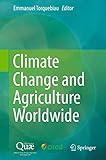Climate change and agriculture worldwide / Emmanuel Torquebiau, editor ; translated by David Manley and Paul Cowan
Torquebiau, Emmanuel [editor] | Manley, David [traductor/a] | Cowan, Paul [traductor/a].
Tipo de material: Libro
impreso(a)
y electrónico
Editor: New York, New York, United States: Éditions Quæ Springer Dordrecht Heidelberg, c2016Descripción: xxiv, 348 páginas : fotografías, ilustraciones, mapas, retratos ; 24 centímetros.ISBN: 9401774609; 9789401774604.Tema(s): Climatología agrícola
Libro
impreso(a)
y electrónico
Editor: New York, New York, United States: Éditions Quæ Springer Dordrecht Heidelberg, c2016Descripción: xxiv, 348 páginas : fotografías, ilustraciones, mapas, retratos ; 24 centímetros.ISBN: 9401774609; 9789401774604.Tema(s): Climatología agrícola| Tipo de ítem | Biblioteca actual | Colección | Signatura | Estado | Fecha de vencimiento | Código de barras |
|---|---|---|---|---|---|---|
| Libros | Biblioteca Electrónica Recursos en línea (RE) | Acervo General | Recurso digital | ECO400577329962 | ||
| Libros |
Biblioteca San Cristóbal
Texto en la configuración de la biblioteca San Cristóbal |
Acervo General | 632.1 C5 | Disponible | ECO010018783 |
Incluye bibliografía
1 How Climate Change Reshuffles the Cards for Agriculture.. Part I Coping with Climate Change.. 2 Hazards, Vulnerability and Risk.. 3 Rice Adaptation Strategies in Response to Heat Stress at Flowering.. 4 Adaptation to Salinity.. 5 Enhanced Drought Adaptation in African Savanna Crops.. 6 Tropical Crop Pests and Diseases in a Climate Change Setting-A Few Examples.. 7 Healthy Tropical Plants to Mitigate the Impact of Climate Change-As Exemplified in Coffee.. 8 Climate Change and Vector-Borne Diseases.. 9 Relationships Between Tropical Annual Cropping Systems and Climate Change.. Part II Seeking Novel Practices.. 10 Livestock Farming Constraints in Developing Countries- From Adaptation to Mitigation in Ruminant Production Systems.. 11 Climate-Smart Farms? Case Studies in Burkina Faso and Colombia.. 12 Joint Management of Water Resources in Response to Climate Change Disruptions.. 13 Agricultural Organic Waste Recycling to Reduce Greenhouse Gas Emissions.. 14 Will Tropical Rainforests Survive Climate Change?.. 15 Adaptation and Mitigation in Tropical Tree Plantations.. 16 Coffee and Cocoa Production in Agroforestry-A Climate-Smart Agriculture Model.. Part III Stimulating Change.. 17 Impact of Climate Change on Food Consumption and Nutrition.. 18 The One Health Concept to Dovetail Health and Climate Change Policies.. 19 Impact of Climate Change on Ecosystem Services.. 20 Life Cycle Assessment to Understand Agriculture-Climate Change Linkages.. 21 Payment for Environmental Services in Climate Change Policies.. 22 Tackling the Climate Change Challenge: What Roles for Certification and Ecolabels?.. 23 Climate Policy Assessment on Global and National Scales.. Part IV Looking Ahead.. 24 What About Climate-Smart Agriculture?.. 25 Climate-Smart Agriculture and International Climate Change Negotiation Forums.. 26 New Research Perspectives to Address Climate Challenges Facing Agriculture Worldwide
Disponible para usuarios de ECOSUR con su clave de acceso
In recent years, especially with the approach of the 21st Session of the Conference of the Parties to the United Nations Framework Convention on Climate Change in Paris in late 2015, the number of publications, conferences and meetings on climate change has been growing exponentially. Yet uncertainties remain concerning rural tropical areas where models are forecasting the onset of multiple disorders and trends are unclear. Meanwhile, the impact of climate change on the poorest communities is regularly documented, often prompting alarmist reactions. How can food security be achieved while adapting to and mitigating climate change? What are the main threats to agriculture in developing countries? How do farmers in these countries cope with the threats? What does agricultural research propose? What options have yet to be investigated? A broad scope of scientific research is underway to address these challenges. Diverse solutions are available, including new agricultural practices, water management, agricultural waste recycling, diagnosis of emerging diseases, payment for ecosystem services, etc. Gaining insight into the financial and political mechanisms that underlie international climate negotiations is also essential to design practical ways to deal with climate issues and meet sustainable development requirements in collaboration with farmers. This book pools the wealth of experience of dozens of researchers and development officers from a range of disciplines. We have focused on making it detailed, accurate and hopefully easy to read for researchers, students and all other informed readers. eng
Disponible en línea
Adobe Acrobat profesional 6.0 o superior
Subscripción a EBSCOhost Julio del 2016
